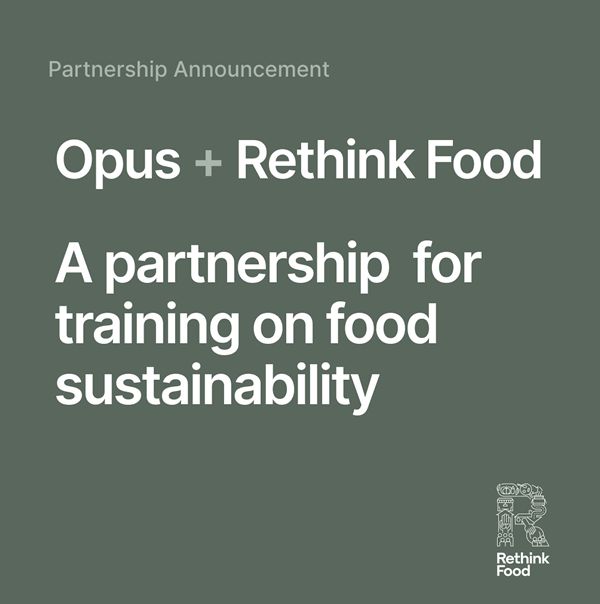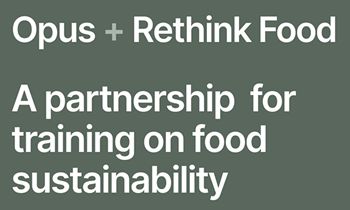
 New York, NY (-) Opus Training, the leading mobile-first training solution for employers with a “deskless” workforce, announced today that the company has entered into an ongoing partnership with Rethink Food, a nonprofit with the mission to create a more sustainable and equitable food system–one where everyone has access to high-quality, nutritious, and affordable food.
New York, NY (-) Opus Training, the leading mobile-first training solution for employers with a “deskless” workforce, announced today that the company has entered into an ongoing partnership with Rethink Food, a nonprofit with the mission to create a more sustainable and equitable food system–one where everyone has access to high-quality, nutritious, and affordable food.
The partnership allows Opus to offer Rethink Food’s educational content that is solutions-oriented and focused on sustainability and community work. Employees will be able to access training on topics ranging from the environmental benefits of using excess food to food insecurity and how they can better support their local communities.
Rethink Food is committed to bridging the gap between the 108 billion pounds of food that go to waste each year and the 38 million Americans impacted by food insecurity. Rethink Food partners with dozens of local restaurants, to prepare nutritious meals for food-insecure communities–while supporting economic development and utilizing excess and/or donated food when possible. Since April 2020, the organization has delivered 7 million meals to local communities and has used 1.2 million pounds of excess and/or donated food–saving 3 million lbs of CO2 and 27.6 million gallons of fresh H20.
Opus has built proprietary technology that helps employers create, distribute, and track on-the-job learning in a way that is accessible to 100% of their workforce through their mobile app.
“We’re excited to partner with Opus on this impactful initiative. As a chef, I saw firsthand how much good food from restaurants goes underutilized, and it’s critical to increase awareness on how we can collectively transform excess food into nutritious meals–and connect these meals with areas of food insecurity,” said Matt Jozwiak, Founder & CEO of Rethink Food. “Through its powerful platform, Opus enables us to efficiently and effectively deliver educational content that empowers restaurants to be at the heart of the solution in moving towards a more sustainable and equitable food system.”
“Sustainability and food insecurity are deeply intertwined in the lives of working Americans. Partnering with Rethink Food is the perfect opportunity to deliver quality training content to frontline employees on sustainability while also making an impact on the broader world,” said Rachael Nemeth, CEO of Opus. “We’re proud to be working with them to deliver meaningful content to our customers and beyond.”
About Rethink Food
Founded in 2017, Rethink Food is a nonprofit with the mission to create a more sustainable and equitable food system. As part of its flagship program, Rethink Certified, Rethink Food works with restaurants, kitchens, and corporations to prepare nutritious and culturally celebrated meals for food-insecure communities. Rethink Food also operates a commissary that prepares 9,000 meals a week using a mix of purchased, donated, and excess food. Since April 2020, Rethink Food has delivered 7 million meals to local communities, used 1.2 million pounds of excess and/or donated food, directed over $30M to 115+ restaurants and food establishments across New York City, Chicago, San Francisco, Nashville, and Miami, and partnered with 125+ community-based organizations to distribute meals. For more information, visit rethinkfood.org.
About Opus
Opus is the leading mobile-first training solution for businesses with “deskless” employees. With technology built explicitly for the 70% of the American workforce that doesn’t sit at a desk, Opus helps employers engage and train their frontline while increasing output and retention. This allows them to position themselves as employers of choice. Learn more at www.opus.so.
